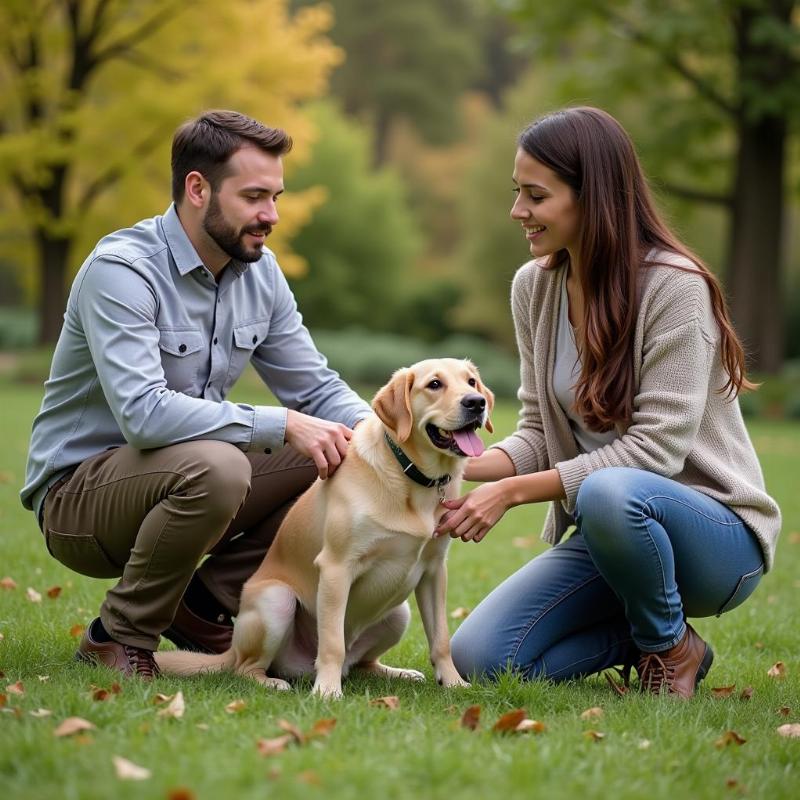Dog aggression can be a challenging hurdle for pet owners, especially when it comes to socializing their furry friends. Understanding the root causes of this aggression and employing effective socialization techniques are crucial for creating a positive and safe environment for your dog and others. This article will provide you with a comprehensive guide to navigating the complexities of socializing dogs with dog aggression, empowering you to help your canine companion build healthy relationships.
Understanding Dog Aggression: It’s More Than Just Growling
Dog aggression isn’t always about outright attacks. It encompasses a spectrum of behaviors, from subtle warnings like stiffening and lip curling to more overt displays like growling, snapping, and biting. Recognizing these signs is the first step in addressing the issue. Why do some dogs exhibit aggression towards other dogs? Several factors can contribute, including fear, territoriality, protective instincts, past negative experiences, and even medical conditions. A veterinarian can help rule out any underlying medical causes, while a certified professional dog trainer can assess the specific triggers and recommend a tailored behavior modification plan.
Socialization Strategies for Aggressive Dogs: A Gradual Approach
Socializing an aggressive dog requires patience, consistency, and a carefully structured approach. Rushing the process can exacerbate the aggression and create negative associations. Start with controlled, brief exposures to calm, well-socialized dogs at a safe distance. Positive reinforcement, such as treats and praise, can help your dog associate other dogs with positive experiences. Gradually decrease the distance between the dogs as your dog shows signs of comfort and relaxation. Remember, progress may not be linear, and setbacks are normal. Adjust your pace based on your dog’s individual needs and responses.
Creating Positive Associations: Reward the Calm
Rewarding calm behavior is a cornerstone of successful socialization. When your dog exhibits calm body language in the presence of other dogs, immediately reward them with praise, treats, or a favorite toy. This helps reinforce the desired behavior and creates a positive association with other dogs.
Seeking Professional Guidance: The Importance of Expert Help
 Seeking professional support
Seeking professional support
Working with a qualified professional dog trainer or behaviorist is highly recommended when dealing with dog aggression. They can assess your dog’s specific needs, identify triggers, and develop a personalized behavior modification plan. A professional can also provide guidance on safe handling techniques and create a structured socialization program tailored to your dog’s individual challenges. Don’t hesitate to seek professional help – it’s an investment in your dog’s well-being and the safety of others.
Conclusion: Patience, Persistence, and Professional Support
Socializing a dog with dog aggression requires a thoughtful and patient approach. By understanding the underlying causes, implementing effective strategies, and seeking professional guidance, you can help your dog overcome their aggression and build positive relationships with other dogs. Remember, consistency is key, and celebrating small victories along the way will keep you and your dog motivated.
FAQ: Common Questions About Socializing Aggressive Dogs
- How do I know if my dog’s aggression is serious? Any signs of aggression, such as growling, snapping, or biting, should be taken seriously. Consult with a veterinarian or certified dog trainer for professional evaluation.
- Can an aggressive dog ever be fully socialized? With proper training, management, and patience, many aggressive dogs can learn to tolerate and even enjoy the company of other dogs.
- Is it safe to socialize an aggressive dog with puppies? It’s generally not recommended to socialize an aggressive dog with puppies, as the puppy’s playful behavior could trigger the aggression.
- What should I do if my dog becomes aggressive during a socialization session? Immediately separate the dogs and consult with your dog trainer or behaviorist.
- How long does it take to socialize an aggressive dog? The timeline varies depending on the severity of the aggression, the dog’s individual temperament, and the consistency of the training. It can take weeks, months, or even years.
- Are there any breeds that are more prone to dog aggression? While some breeds have a reputation for being more protective or territorial, any dog can exhibit dog aggression.
- What are some common mistakes to avoid when socializing an aggressive dog? Rushing the process, forcing interactions, and using punishment can worsen aggression.
Related Articles
how to train a livestock guard dog
my dog is very protective of me
dog training mount vernon wa
dog friendly parks richmond va
About Beautdogs.us
Beautdogs.us is your premier online destination for all things dog-related in the United States. We offer expert advice on dog breeds, care, and training, empowering you to provide the best possible care for your canine companion. Whether you’re a new dog owner or a seasoned expert, Beautdogs.us provides reliable information and resources to enhance your dog’s well-being and strengthen your bond. Contact us today at [email protected] or +1 501-555-7529 for personalized support and expert guidance.